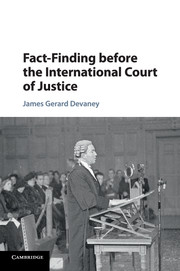Book contents
- Frontmatter
- Contents
- Table of cases
- Acknowledgements
- Introduction
- 1 Rules of evidence before the International Court of Justice
- 2 Criticisms of the Court's current reactive approach to fact-finding
- 3 The practice of other international courts and tribunals
- 4 Winds of change: the possibility of reform
- 5 A more proactive approach to fact-finding
- Epilogue
- Bibliography
- Index
2 - Criticisms of the Court's current reactive approach to fact-finding
Published online by Cambridge University Press: 05 September 2016
- Frontmatter
- Contents
- Table of cases
- Acknowledgements
- Introduction
- 1 Rules of evidence before the International Court of Justice
- 2 Criticisms of the Court's current reactive approach to fact-finding
- 3 The practice of other international courts and tribunals
- 4 Winds of change: the possibility of reform
- 5 A more proactive approach to fact-finding
- Epilogue
- Bibliography
- Index
Summary
Introduction: is the ICJ factually challenged?
Chapter 1 assessed the Court's traditional reactive approach to fact-finding. It was argued that the Court's approach has been influenced by a number of factors including its status as an international judicial body with no compulsory jurisdiction, and by the sovereign nature of the States party to cases that come before it. However, in recent times there has been considerable criticism of the Court's reactive approach to fact-finding. Whilst it is acknowledged that there are a number of reasons that explain why the Court has historically taken this reactive approach to fact-finding, and that in some situations the Court's reactive approach is justifiable, it is these recent criticisms that this chapter sets out to assess. The criticisms explored in this chapter at the very least merit a re-examination of the Court's approach to the facts. To what extent these deficiencies can be overcome is a topic to which we will return in Chapter 4.
Recent criticisms can be divided into two main groups: (i) those relating to abundant or particularly complex or technical facts before the Court and (ii) those relating to a lack of evidence before the Court. The first group of criticisms are diverse and relate to the Court's difficulties in dealing with copious, complex or scientific evidence that are increasingly prevalent in international adjudication. Criticisms of the Court's reactive approach when faced with this kind of evidence will be considered in the first half of this chapter.
The second group of criticisms, concerning the lack of evidence before the Court, includes (but is not limited to) the non-appearance of States before the Court. In cases where a party fails to appear before the Court its reactive approach to fact-finding is found wanting due to the fact that it only has the evidence of one party upon which to make its findings-of-fact. Without conducting its own investigations into the factual background of the case at hand the Court's reactive approach, which makes it dependent on States to submit the facts to it, is a handicap for the Court. In such cases the Court is forced to cast its net wider to obtain facts from fact-finding commissions or to rely on public knowledge in order to attempt to fill the void in the evidentiary record left by the non-appearing party.
- Type
- Chapter
- Information
- Fact-Finding before the International Court of Justice , pp. 73 - 126Publisher: Cambridge University PressPrint publication year: 2016



